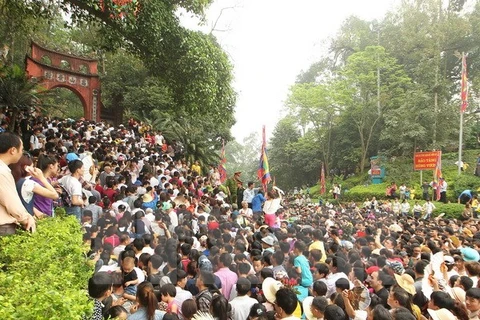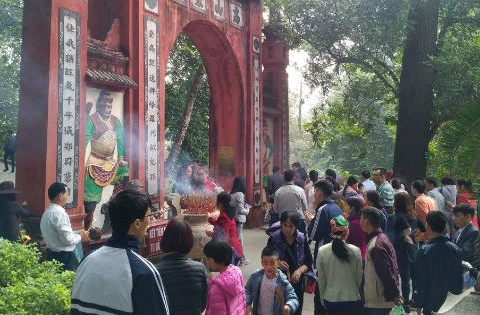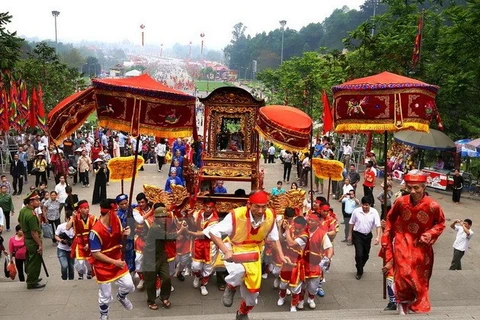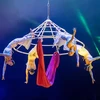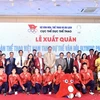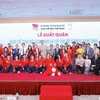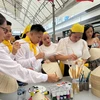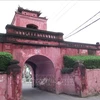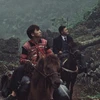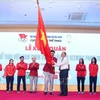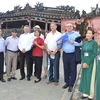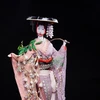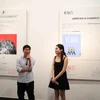Phu Tho (VNA) - The preparation for the death anniversary of the Hung Kings and the 2017 Hung Kings Temple Festival in the northern province of Phu Tho has been completed, said the organising board.
The province has made thorough plans on firefighting, rescue and traffic control while installing camera systems at the Hung Kings Temple Relic Site, major streets and key areas in Viet Tri city.
Inspection teams will be established for regular checks, while a hotline active around the clock will be set up to receive feedback. Local shop owners have also committed to not overcharging visitors.
Various activities will take place during the festival, such as a street festival and art programme in Viet Tri city, with the participation of nearly 2,000 local residents of 23 communes and districts, along with cultural concerts and a swimming competition.
In addition, there will be a number of exhibitions featuring photos and items on Hung King worshipping rituals, as well as performances of xoan singing, in a bid to make it recognised as an intangible cultural heritage of the world.
A highlight of the event is a five-day book festival, which will include book signing events, meetings with authors and book donation for schools and libraries in the remote and mountainous areas.
Visitors to the festival will be able to experience procedures to make handicraft products and traditional dishes of each locality, thus boosting investment in tourism and creating favourable conditions for conserving national culture.
The Hung Kings founded the first nation in the history of Vietnam, called Van Lang, in Phong Chau (now Phu Tho province). Ruling the country through 18 generations (2879–258 BC), the Hung Kings taught locals how to grow wet rice. They chose Nghia Linh Mountain, the highest in the region, to perform rituals devoted to rice and sun deities to pray for lush crops.
To honour their great contributions, a complex of temples dedicated to them was built on Nghia Linh Mountain, and the tenth day of the third lunar month serves as the national commemorative anniversary for the kings.
The worshipping rituals of the Hung Kings was recognised as UNESCO Intangible Cultural Heritage of Humanity in 2012.-VNA
The province has made thorough plans on firefighting, rescue and traffic control while installing camera systems at the Hung Kings Temple Relic Site, major streets and key areas in Viet Tri city.
Inspection teams will be established for regular checks, while a hotline active around the clock will be set up to receive feedback. Local shop owners have also committed to not overcharging visitors.
Various activities will take place during the festival, such as a street festival and art programme in Viet Tri city, with the participation of nearly 2,000 local residents of 23 communes and districts, along with cultural concerts and a swimming competition.
In addition, there will be a number of exhibitions featuring photos and items on Hung King worshipping rituals, as well as performances of xoan singing, in a bid to make it recognised as an intangible cultural heritage of the world.
A highlight of the event is a five-day book festival, which will include book signing events, meetings with authors and book donation for schools and libraries in the remote and mountainous areas.
Visitors to the festival will be able to experience procedures to make handicraft products and traditional dishes of each locality, thus boosting investment in tourism and creating favourable conditions for conserving national culture.
The Hung Kings founded the first nation in the history of Vietnam, called Van Lang, in Phong Chau (now Phu Tho province). Ruling the country through 18 generations (2879–258 BC), the Hung Kings taught locals how to grow wet rice. They chose Nghia Linh Mountain, the highest in the region, to perform rituals devoted to rice and sun deities to pray for lush crops.
To honour their great contributions, a complex of temples dedicated to them was built on Nghia Linh Mountain, and the tenth day of the third lunar month serves as the national commemorative anniversary for the kings.
The worshipping rituals of the Hung Kings was recognised as UNESCO Intangible Cultural Heritage of Humanity in 2012.-VNA
VNA

